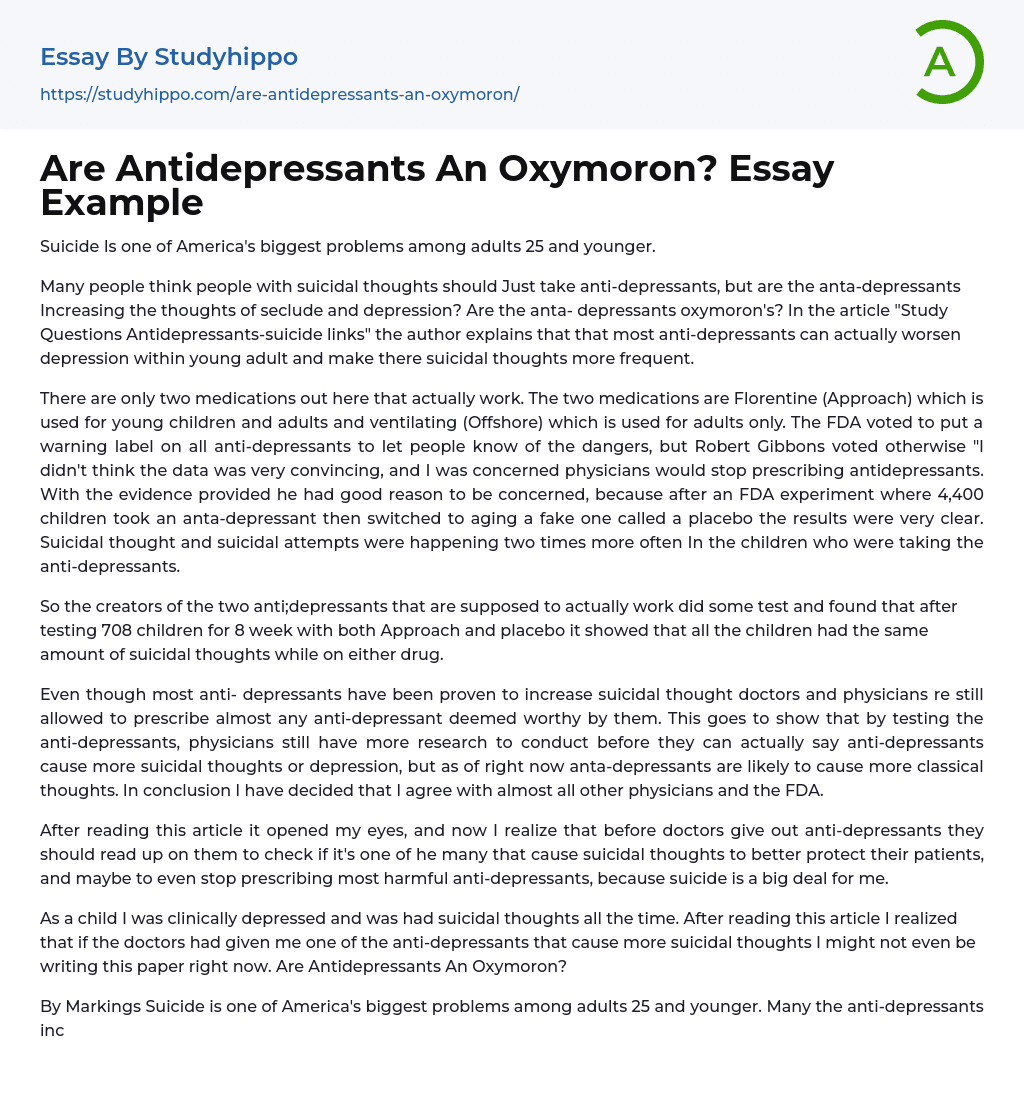Concerns have been raised about prescribing anti-depressants for young adults with suicidal thoughts due to the high rates of suicide in America. The article "Study Questions Antidepressants-suicide links" notes that most anti-depressants can actually increase suicidal thoughts and worsen depression. The only two effective medications are Florentine (Approach) for young children and adults, and ventilating (Offshore) for adults only. Although the FDA issued warning labels about the risks of anti-depressants, Robert Gibbons opposed this as he feared physicians would stop prescribing them altogether. However, studies have shown that those taking anti-depressants had twice as many suicidal thoughts and attempts compared to those on a placebo. Additionally, a test conducted on 708 children by creators of two believed-to-be-effective anti-depressants showed equal amounts of suicidal thoughts regardless of which drug was given over eigh
...t weeks. It is clear that more research needs to be done into the potential link between anti-depressants and suicidal thoughts/depression before they are prescribed. Caution is necessary when administering these drugs as they may lead to classical thoughts or an increased risk of suicide.
As someone who experienced clinical depression and suicidal thoughts during childhood, I have a deep understanding of the gravity of this issue. The question of whether anti-depressants contradict their purpose arises, as suicide is a serious concern among young adults in the US. This has led many to wonder if antidepressants actually contribute to an increase in depression and suicidal thoughts. While some individuals like Robert Gibbons do not see any dangers associated with these drugs, the results from an FDA experiment suggest otherwise. The study involved 4,400 children who were given antidepressant medication before switching medications; findings showed
that twice as many attempted suicides occurred amongst those taking antidepressant medication. Despite manufacturers of two specific anti-depressants asserting that their drugs do not cause depression or suicidal ideation, data suggests that anti-depressants may exacerbate suicidal behavior.
- Hospital essays
- Physician essays
- Health Care Provider essays
- Universal Health Care essays
- Readmission essays
- Abnormal Psychology essays
- Abraham Maslow essays
- Attachment Theory essays
- Authority essays
- Behaviorism essays
- Classical Conditioning essays
- Cognitive Psychology essays
- Counseling essays
- Developmental Psychology essays
- Educational Psychology essays
- Erik Erikson essays
- Family Therapy essays
- Jean Piaget essays
- Maslow's Hierarchy Of Needs essays
- Mental Health essays
- Operant Conditioning essays
- Personality Psychology essays
- Positive Psychology essays
- Psychoanalysis essays
- Psychotherapy essays
- Sigmund Freud essays
- Social Psychology essays
- Stanford Prison Experiment essays
- Supersize Me essays
- John Locke essays
- 9/11 essays
- A Good Teacher essays
- A Healthy Diet essays
- A Modest Proposal essays
- A&P essays
- Academic Achievement essays
- Achievement essays
- Achieving goals essays
- Admission essays
- Advantages And Disadvantages Of Internet essays
- Alcoholic drinks essays
- Ammonia essays
- Analytical essays
- Ancient Olympic Games essays
- APA essays
- Arabian Peninsula essays
- Argument essays
- Argumentative essays
- Art essays
- Atlantic Ocean essays




